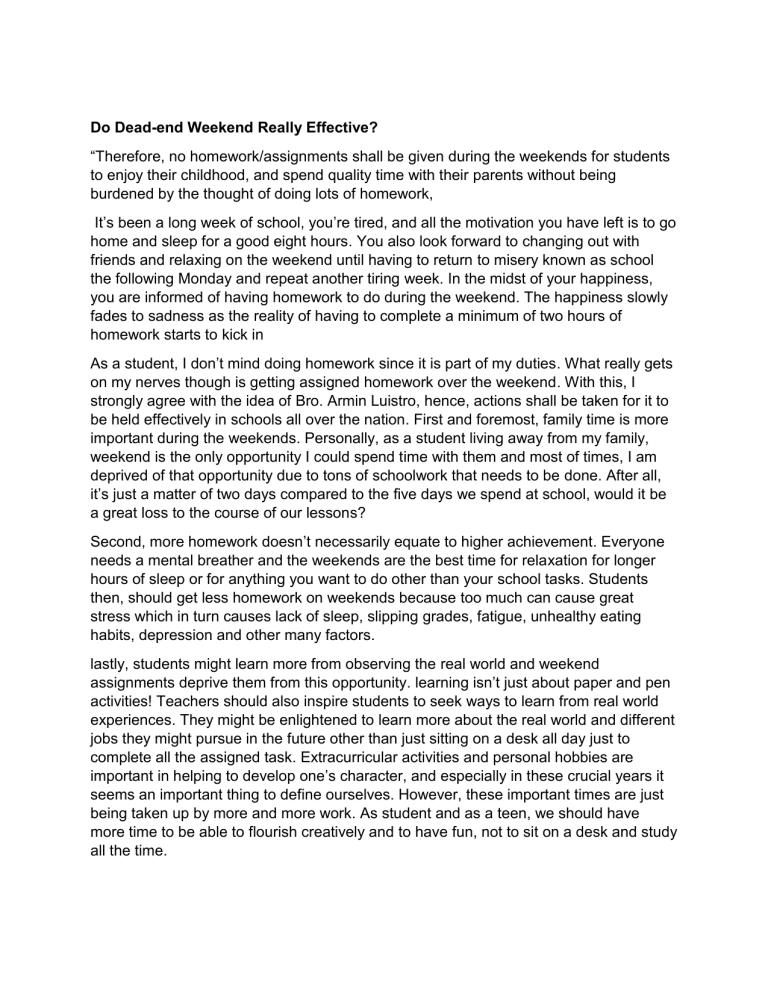
Do Dead-end Weekend Really Effective? “Therefore, no homework/assignments shall be given during the weekends for students to enjoy their childhood, and spend quality time with their parents without being burdened by the thought of doing lots of homework, It’s been a long week of school, you’re tired, and all the motivation you have left is to go home and sleep for a good eight hours. You also look forward to changing out with friends and relaxing on the weekend until having to return to misery known as school the following Monday and repeat another tiring week. In the midst of your happiness, you are informed of having homework to do during the weekend. The happiness slowly fades to sadness as the reality of having to complete a minimum of two hours of homework starts to kick in As a student, I don’t mind doing homework since it is part of my duties. What really gets on my nerves though is getting assigned homework over the weekend. With this, I strongly agree with the idea of Bro. Armin Luistro, hence, actions shall be taken for it to be held effectively in schools all over the nation. First and foremost, family time is more important during the weekends. Personally, as a student living away from my family, weekend is the only opportunity I could spend time with them and most of times, I am deprived of that opportunity due to tons of schoolwork that needs to be done. After all, it’s just a matter of two days compared to the five days we spend at school, would it be a great loss to the course of our lessons? Second, more homework doesn’t necessarily equate to higher achievement. Everyone needs a mental breather and the weekends are the best time for relaxation for longer hours of sleep or for anything you want to do other than your school tasks. Students then, should get less homework on weekends because too much can cause great stress which in turn causes lack of sleep, slipping grades, fatigue, unhealthy eating habits, depression and other many factors. lastly, students might learn more from observing the real world and weekend assignments deprive them from this opportunity. learning isn’t just about paper and pen activities! Teachers should also inspire students to seek ways to learn from real world experiences. They might be enlightened to learn more about the real world and different jobs they might pursue in the future other than just sitting on a desk all day just to complete all the assigned task. Extracurricular activities and personal hobbies are important in helping to develop one’s character, and especially in these crucial years it seems an important thing to define ourselves. However, these important times are just being taken up by more and more work. As student and as a teen, we should have more time to be able to flourish creatively and to have fun, not to sit on a desk and study all the time. The bottom line of this is we want only what’s best for our students. We don’t train robots, we train humans. We don’t only fill the brains of our students. We should be able to fill their hearts. Let’s make learning easy and enjoyable. Let us not take times in which children and teens could not do something great with their family and treasure the memory for the rest of their lives. Let us not make learning a horrible experience for our students. Weekends are the perfect time to get a couple days without having to worry about completing homework, and if all teachers were not to give homework, then there would probably be an improvement in student’s attitude towards actually doing homework during the week, thus counteracting their journey to the dead-end weekend. Apple Villamor 12- GAS (REMBRANDT) CORRUPTION The Philippines is widely held to be the oldest democracy in Asia. Democratic institutions such as separation of powers, judicial independence, and rule of law had good foundations, but were eroded by a personalistic political system and ambiguous policies in the past which allowed too much discretion given to government officials in dispensing resources and services. This discretionary power, in a context of brittle accountability, supplied the basic incentives for corruption The Philippines is not lacking in efforts in curbing corruption. Anti-corruption policies and measures are in place to deal with the different kinds of corrupt activities and behavior in the government. In fact, it is even observed that there are too many laws and regulatory mechanisms that tend to overlap with each other. If executed thoroughly, these laws are sufficient and comprehensive enough to discourage corrupt acts. Almost all regimes made anti-corruption efforts its slogan and correspondingly created new offices to carry this out as these efforts seemed to create the impression that the new administration is serious in its anti-corruption initiatives. Creation of such bodies however only resulted to redundant functions and wastage of government resources. While the Philippines has sufficiently created the legal framework for addressing the issue and created institutions charged with combating specific corruption issues, apparently it sorely lacks efforts to successfully implement these laws. Absence of a committed leadership and political will has jeopardized the efforts to curb corruption. Corrupt politicians and government officials seemed not to be short of inventive ways to circumvent the safeguards in place. Corruption is a governance issue because it involves effective functioning of institutions and management of society thru its political, economic, social and judicial mechanisms. When these formal and informal institutions break down, laws and policies that ensure accountability and transparency of the government become harder to implement. The Philippine experience showed that ruling groups, at their will, can reduce accountability, either thru lack of transparency or by declaring certain areas of decision making off limits to scrutiny and intervention. Hence, it is necessary that mechanisms towards reducing opportunities to monopolize power is in place such that any actions that may undermine accountability are immediately preempted and disciplined. The control of corruption requires three strategies. First, the formal machinery of monitoring officials and politicians needs to be drastically improved. There is a need for political will to implement this. Second, this will can be generated by popular pressure. We cannot expect the bureaucrats and politicians who benefit from the political system to reform themselves. Third, the public must be educated to exert moral and political pressure to outlaw corruption. The mobilization of such public pressure depends on a clearer understanding of the modern concepts of public office and public service and a more widespread awareness of the social costs and political risks which corruption entails. “POLITICAL ISSUES” SUBMITTED BY: KATHLENE MAY B. AUTIDA SUBMITTED TO: JONA S. BABATUAN



